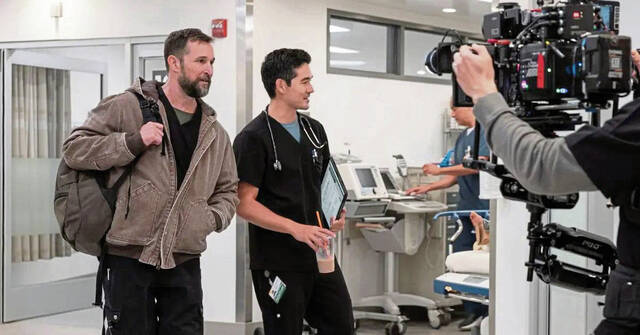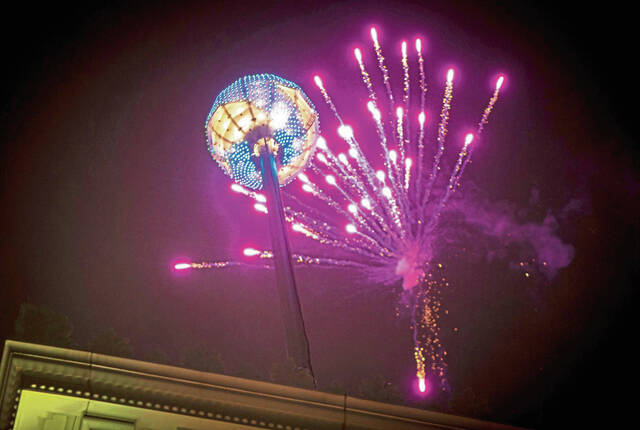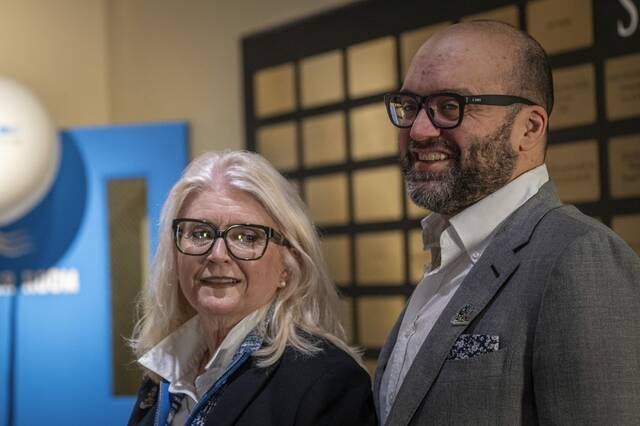Most of us have seen this movie scene: the intrepid protagonist is starting to put the pieces together, but more research is needed. Our hero is seated in a dim library basement, their face illuminated by the flickering light of a microfilm reader as they scroll through a long reel of plastic tape containing newspapers and archives from the distant past.
These days, we’re lucky that much more material can be found online – but believe it or not, many libraries do still have a microfilm reader, and the Carnegie Carnegie is one of them! Back issues of now-defunct local papers like the Carnegie Union, the Mansfield Item, and the Gateway Press fill our filing cabinet of microfilm reels. And of course, patrons are welcome to use our reader to view microfilm reels that they’ve requested through the mail from the collections of other libraries.
This was the case when I had the pleasure of meeting Dr. David Rosenberg. He caught my attention at once – after all, it’s fairly rare to see anyone sitting at our microfilm reader. I said hello and helped out with a minor tech glitch; he was kind enough to tell me about his research.
This was my first encounter with his exhibit, originally entitled “Who is a Jew? Amiens, France, 1940-45,” which will be on display at the Andrew Carnegie Free Library & Music Hall from Oct. 2 through Nov. 30 under the title “The Fruits of Hate: A French City During the Holocaust.” This will be the exhibit’s first showing at a public library in the United States.
Rosenberg’s exhibit centers around a collection of identification cards used by Jewish citizens of Amiens, France, during the German occupation, which began in 1940. Until that point, the French government did not maintain any records designating individuals as Jewish or non-Jewish, but that changed with a new law that required all Jews to register with the police or local government. These identification cards that marked the bearer as Jewish form the core of the exhibit’s story, which also includes translated correspondence that delves deeper into the lives – and ultimate fates – of the Jewish population of Amiens.
The moving story told by these cards, letters, photos and recordings is the result of research conducted by Rosenberg since 2011. His work has been embraced by the community of Amiens itself – the city has erected a memorial plaque at the site of a war-era synagogue, and he received the Medal of the City of Amiens in 2023. It’s truly an honor for our library to collaborate with Rosenberg to feature his work.
Especially here in the Pittsburgh area, it’s no secret that antisemitism is on the rise. The much-publicized trial of the Pittsburgh synagogue shooter has been a constant presence in the news this summer. The Jewish Federation of Greater Pittsburgh documented 146 antisemitic incidents in the city during the first half of 2023 alone. The lessons of the Holocaust remain sadly relevant today – we know where a road like this can lead. Remembering those lost to genocide is a vital and humanizing action for us to take. As a human being and as a professional librarian, I am grateful for the archival preservation that enabled Rosenberg to tell this story.
“The Fruits of Hate” will be open to the public during regular Library hours from Oct. 2 through Nov. 30. An opening reception will be held in the Library on the evening of Oct. 17. Further information is available at www.CarnegieCarnegie.org.








